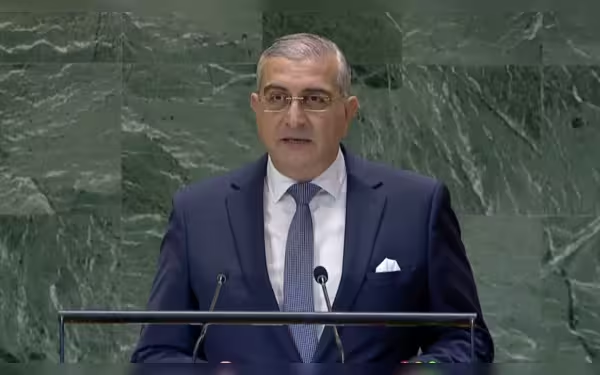Saturday, November 16, 2024 07:40 PM
Syria Opposes UN Pact, Criticizes Western Interests and Israeli Aggression
- Syria rejects 'Pact for the Future' at UN.
- Al-Dahhak condemns Israeli occupation and Western sanctions.
- Call for reforms in global financial institutions emphasized.
 Image Credits: arabnewspk
Image Credits: arabnewspkSyria criticizes the 'Pact for the Future' at the UN, highlighting Western interests and Israeli aggression.
In a significant development at the United Nations, Syria has voiced its strong opposition to the recently adopted "Pact for the Future." This pact, which garnered support from 143 out of 193 UN member states, aims to restore faith in the UN's ability to address pressing global issues. However, Syria's permanent representative to the UN, Qusay Al-Dahhak, argues that the pact falls short of necessary reforms and primarily serves the "narrow interests" of a select group of Western nations.
During the "Summit for the Future" held in New York, Al-Dahhak emphasized that the aspirations of those who support the pact can only be realized through "radical change." He urged Western countries to abandon outdated mindsets and hegemonic ambitions, advocating for respect towards the independent choices of nations. Al-Dahhak's remarks reflect a broader sentiment among nations that feel marginalized by Western policies.
He criticized the "illegal measures" imposed by Western nations, which he claims have severely impacted the Syrian people, depriving them of their future and access to national resources. Despite these challenges, Al-Dahhak expressed a resolute determination among Syrians to forge their own path forward.
The sanctions imposed by the US, EU, Canada, Australia, and Switzerland since the onset of the Syrian civil war in 2011 have further complicated the situation. Al-Dahhak called for a future built on dialogue and diplomacy, emphasizing the need for multilateral cooperation and adherence to the principles outlined in the UN Charter. He argued that the current form of the pact does not adequately support these goals.
Moreover, Al-Dahhak condemned the ongoing Israeli occupation of Arab territories, including Palestine, Syria, and Lebanon. He described Israel's actions as "acts of aggression, crimes of genocide and ethnic cleansing," which he believes violate international law and hinder the collective aspirations for peace and stability in the region. He stressed the importance of uniting efforts within the UN to confront Israel's regional aggression.
In addition to addressing the Israeli occupation, Al-Dahhak pledged Syria's commitment to advocating for reforms in global financial institutions. He believes that such reforms are essential to ensure that developing countries have a voice in global economic decision-making, which could help alleviate the burden of global debt.
The discussions at the UN highlight the complexities of international relations and the ongoing struggles faced by nations like Syria. As the world grapples with various crises, the call for genuine reform and respect for national sovereignty becomes increasingly vital. The path forward requires collaboration, understanding, and a commitment to addressing the needs of all nations, not just a select few. Only through collective action can we hope to build a more equitable and peaceful future for everyone.













